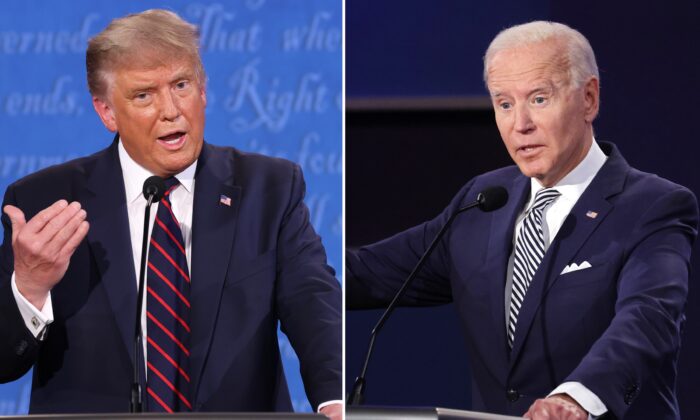India Army Apprehends Chinese Soldier Found in Its Territory
WASHINGTON—Investors and economists have been debating the shape of the post-lockdown economic recovery in the United States for months, and they’ve labeled their forecasts for a rebound with letters such as V, W, or U.
President Donald Trump and his advisers have repeatedly touted a “V-shaped” recovery, as the economic data over the past five months showed an exceptional rebound, with some data points already surpassing pre-pandemic levels.
Democratic presidential nominee Joe Biden, however, disagrees with Trump, describing the recovery as “K-shaped,” with the rich getting richer and the poor getting poorer.
“[Trump] talks about a V-shaped recovery. It’s a K-shaped recovery. If you’re on the top, you’re going to do very well,” Biden said at the ABC News town hall on Oct. 15. “If you’re in the middle or the bottom, your income is coming down. You’re not getting a raise.”
Biden’s comments echoed what some economists have been warning, about the pandemic’s unequal toll on businesses and society. Because of large gaps in the performance of different sectors of the economy, some businesses are doing well while others continue to struggle. And this uneven recovery also is evident in the U.S. labor market.
Some analysts, however, believe that this “alphabet soup” of economic forecasting has become more of a partisan issue.
“The reality is every recovery is K-shaped,” Ed Yardeni, a veteran Wall Street strategist and president of Yardeni Research, told The Epoch Times.
The recession caused by the pandemic would leave many people and businesses behind, he said.
“That happens with every recovery. Not everybody returns back to normal at the same pace, and some may never return back to normal,” Yardeni said.
“The K is really more of a partisan issue, because if we have a K recovery, then obviously we need more government to fix that problem. So, I think K is really more driven by politics than macroeconomics.”
The rebound from the lockdown recession in the U.S. economy over the past five months has been stronger than most economists predicted. And the recent economic data continue to suggest a strong recovery.
Retail sales, a measure of purchases at stores, restaurants, and online continued to rise in September, the fifth straight month of growth, driven by strong sales in housing-related goods, autos, and clothing.
The housing market has also been a bright spot for the economic recovery, supported by record-low interest rates and increased demand for the suburbs. According to the new data released on Oct. 19, homebuilder sentiment set a record high for the second month in a row in October.
Closely followed surveys of consumer sentiment and small-business optimism climbed to their highest levels since the pandemic broke out.
“Investors tend to focus on the broad economy, and they tend to focus on revenues and earnings of companies. And we’re definitely seeing a V-shaped recovery in the S&P 500 revenues and earnings,” Yardeni said.
Despite disappointing jobless claims and labor market recovery in recent weeks, the unemployment rate also dropped to 7.9 percent in September from a peak of 14.7 percent in April.
Effects of a K-shaped Recovery
While some industries are hiring back workers quickly, it’s clear that job losses are heavily concentrated in service industries, according to a new report by the U.S. Chamber of Commerce.
The latest job market data showed the unequal impacts of a K-shaped recovery, with goods-producing industries are the top of the K, while services are the bottom, the report stated.
More than 82 percent of the jobs lost since the beginning of the pandemic are service jobs and leisure and hospitality account for nearly 36 percent of the losses.
Every recession or every recovery is K-shaped, which has winners and losers, according to Nick Reece, senior analyst at Merk Investments.
“It’s just the reality of the world that we live in that some of these areas of the economy are not allowed to reopen. Therefore they don’t even have the possibility of having a V-shaped recovery,” he told the Epoch Times.
In some states such as New York, for example, restaurants are allowed to reopen with indoor dining at 25 percent capacity, he noted.
With these government-mandated lockdowns, “there’s no option for these restaurants to have a 100 percent recovery,” he said, adding that the fiscal support should mainly target those sectors in the lower half of the K.
Large gaps in the performance of different sectors of the economy are also evident in the stock market. Since the March 23 market low, the technology sector rallied above previous all-time highs, while airlines, energy, and hospitality businesses significantly lagged.
“This has created enormous inequality not just in the performance of economic segments, but in society more broadly,” JPMorgan strategist Marko Kolanovic wrote in a report dated Aug. 31.
“On one side, tech fortunes reached all-time highs, while lower-income, blue-collar workers and those that cannot work remotely suffered the most.”
Focus News: On Recovery, Trump Says ‘V,’ While Biden Says ‘K’
US, Brazil Both Need to Reduce Dependence on China Imports: Pompeo
